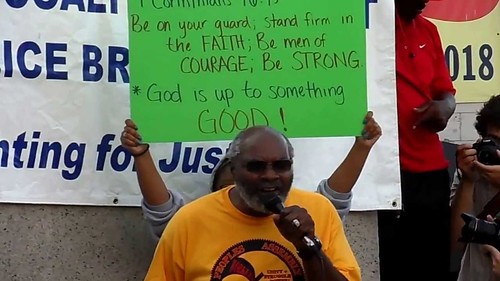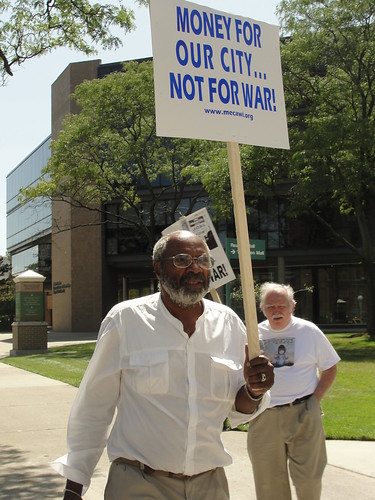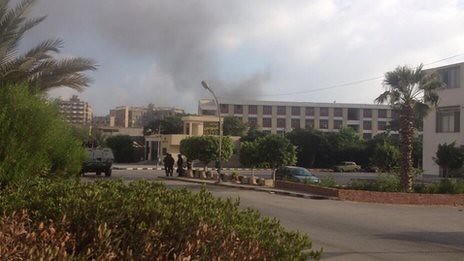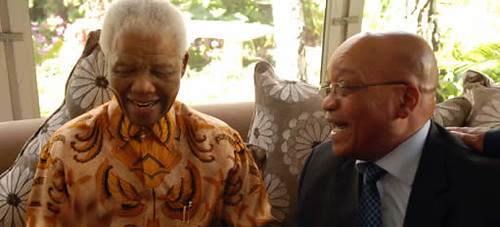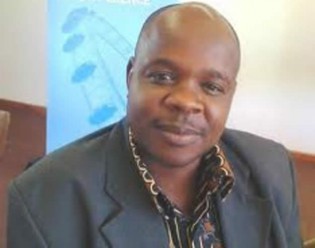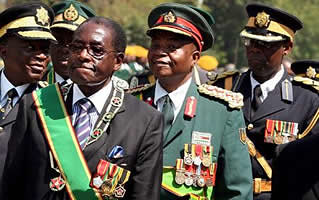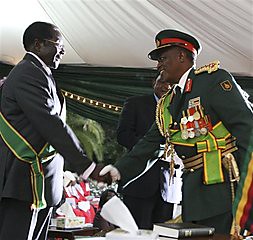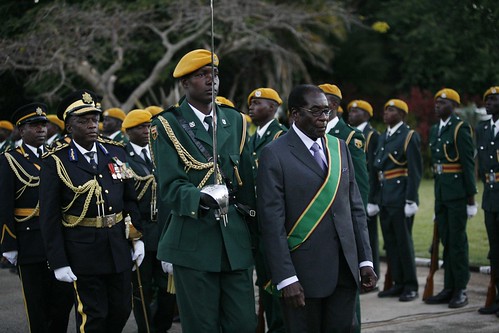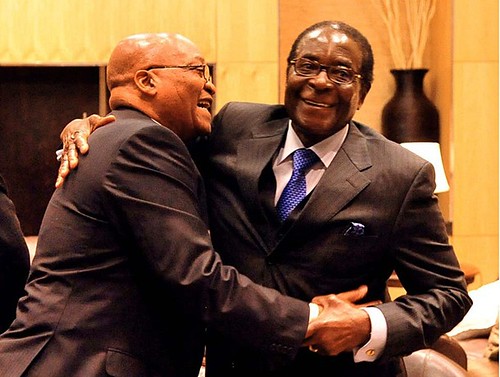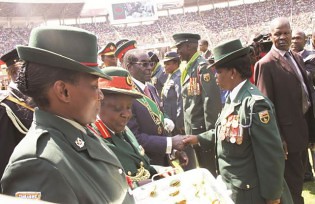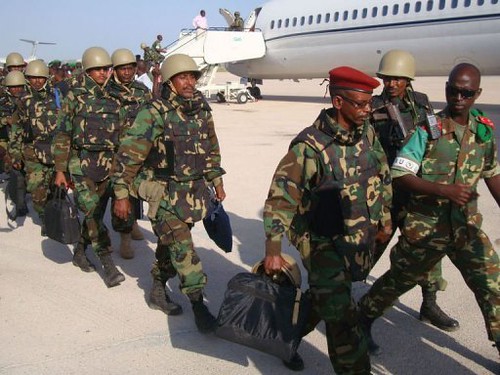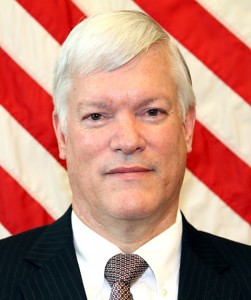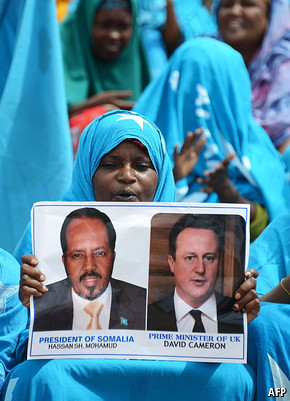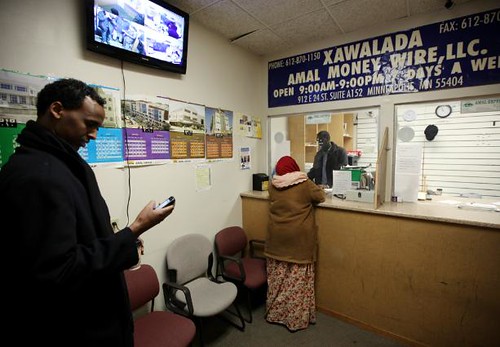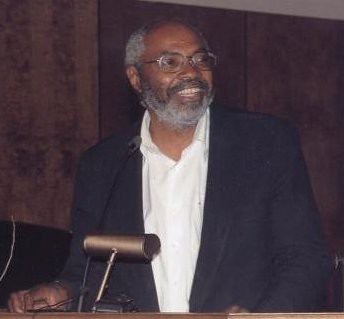
Abayomi Azikiwe, editor of the Pan-African News Wire, at New Bethel Baptist Church in Detroit on March 27, 2010. The event was a rally to demand justice in the assassination of Imam Luqman Ameen Abdullah by the FBI on Oct. 28, 2009., a photo by Pan-African News Wire File Photos on Flickr.
South Africa Commemorates National Women’s Day on August 9
57 years ago women took to the streets challenging national and gender oppression
By Abayomi Azikiwe
Editor, Pan-African News Wire
August 9 represented the 57th anniversary of the Women’s March on Pretoria in 1956. The event attracted 20,000 women to protest the pass laws which were a hallmark of the racist apartheid system.
The period between 1952-1956 has been characterized as the “Defiance Campaign Against Unjust Laws.” Mass mobilizations were organized against the racist system of Bantu education, the dreaded pass laws, the demand for labor rights and the end to legalized segregation and exploitation in the-then Union of South Africa.
This manifestation on August 9 was spearheaded by the Federation of South African Women (FSAW or FEDSAW) which was formed on April 17, 1954 in Johannesburg by leading activists in the national liberation, communist and democratic movements. FEDSAW grew out of the mass upsurge of the African independence struggles that swept the continent in the aftermath of World War II.
Ray Simons, a leading member of the South African Communist Party (SACP), then underground, brought together Helen Joseph, an organizer with the Garment Workers Union and the Congress of Democrats (COD), Lilian Ngoyi of the African National Congress Women’s League (ANCWL) and Amina Cachalia of the Transvaal Indian Congress (TIC), the founder of the Women’s Progressive Union (WPU) and later the ANC. The idea was to create a multi-racial women’s organization to protest against apartheid.
A similar march had been held the year before in Pretoria where 2,000 women demonstrated against the application of the pass laws to them. The success of this gathering encouraged the women to launch a national campaign to bring thousands from around the country to Pretoria.
Pass laws were designed to regulate African, Colored (mixed race) and Indian labor. The pass would designate which ethnic group one belonged to and whether the person had the “right,” under the racist laws, to reside in a particular geographic area.
In essence the pass laws were a tool to facilitate the exploitation of labor and prevent Africans, Coloreds and Indians from interacting and organizing against their oppression. The coming together of African, Colored and Indian progressives was a direct threat to the existence of the racist system.
By mid-1956, the FEDSAW had decided to write a letter to the-then racist Prime Minister J.G. Strijdom requesting a meeting on the pass laws and other issues. Strijdom refused and the women became determined to bring as many as possible to protest outside the Union Buildings, the symbol of the apartheid state.
The organizing efforts by FEDSAW held off the implementation of pass law requirements for African women until the early 1960s. The efforts of FEDSAW and allied organizations brought many people into the national liberation struggle in South Africa.
At the end of 1956, over 100 leading officials and cadres of the democratic movement had been charged with treason. Legal proceeding surrounding these charges went on until 1961 when all charges were eventually dropped.
Nonetheless, the anti-pass campaign of 1960 drew a deadly response from the apartheid state. On March 21 of that year, 69 people were gunned down in Sharpeville outside a police station and both the ANC and the splinter group, the Pan-Africanist Congress, formed in 1959, were banned.
The following year after additional repressive measures, the ANC in conjunction with the SACP, formed a military unit called Um Khonto WeSizwe (Spear of the Nation). The armed wing of the ANC embarked upon a campaign of sabotage where symbols of state and corporate power were targeted.
Continuing a Legacy of Struggle
South African women had challenged the racist system of settler-colonialism on numerous occasions prior to 1956. As early as 1913 there had been demonstrations against the attempts to force women to carry passes.
In the Orange Free State in 1913 women carried out petition drives and mass demonstrations against the pass laws. These protests continued for years and resulted in the racist system withdrawing the pass requirement for women. Many women were arrested and sent to prison during these years in the early 20th century.
By 1953, these laws had been established in the Western Cape designating it as a “Colored Preference Area” which sparked protest demonstrations. Soon the law’s application would spread to other provinces of South Africa.
On January 4, 1953, hundreds of women rallied in Langa Township outside of Cape Town to protest the Native Laws Amendment Act which mandated the carrying of passes for both men and women. The apartheid law determined whether women had the right to be in a particular area depending upon them holding a job. If they could not produce a pass that was “in order” both women and men could be arrested, imprisoned and summarily sent to another city or region of the country.
At the demonstration in Langa on January 4, ANC Women’s League organizer Dora Tamana told the crowd that “We, women, will never carry these passes. This is something that touches my heart. I appeal to you young Africans to come forward and fight. These passes make the road even narrower for us. We have seen unemployment, lack of accommodation and families broken because of passes. We have seen it with our men. Who will look after our children when we go to jail for a small technical offense like not having a pass?”(sahistory.org.za)
Women played an essential role in the struggle against apartheid all during the period of the 1950s through the 1990s, when the ANC took power in 1994. Women enlisted in the ANC as organizers and military combatants. Within the labor movement they were leading organizers in the efforts that lead up to the formation of the Congress of South African Trade Unions (COSATU) in 1985.
The Status of South African Women Today
Although the apartheid system collapsed in 1994, inequality among the races and gender oppression has not been eradicated from South Africa. Even though the overthrow of apartheid was a monumental revolutionary achievement, the country’s economy is still capitalist and subject to class and gender oppression.
In honor of National Women’s Day the ANC issued a statement on August 8 noting “South Africa is a better place for women than it was in 1994. However, despite the many successes recorded by the ANC government, women continue to bear the brunt of poverty, underdevelopment and unemployment. Legislated patriarchy has been removed from the statute books but women continue to be subjected to gender based violence; each incident an inhuman act that should leave South Africans outraged and united in our collective quest to eradicate all forms of discrimination and marginalization.”
In another statement published by COSATU in honor of Women’s Day it stresses that “we would be dishonoring the memory of those heroines of the past and present if we were to be complacent about the huge problems women still confront. Despite the advances since 1994, millions of poor, working class women still battle against unemployment, poverty, discrimination and abuse.”
This same statement goes on to say that COSATU “stands by the national democratic revolution’s strategic objective to build a non-racial, non-sexist and democratic society. Our economic liberation must therefore involve the upliftment of the poor, the majority of whom are African and women.”
In order for this to occur there must be a transformation of capitalist property relations which inherently oppress, exploit and abuse women. At the same time to ensure advances in the struggle against gender oppression more women must be brought into the revolutionary movement and party as organizers and leaders.
As the late Mozambican President Samora Machel stated many years ago: “The liberation of women is not act of charity but a fundamental precondition for the success of our revolution.” The truth of this statement continues both during the struggle for political independence and well as the efforts aimed at establishing socialism.






